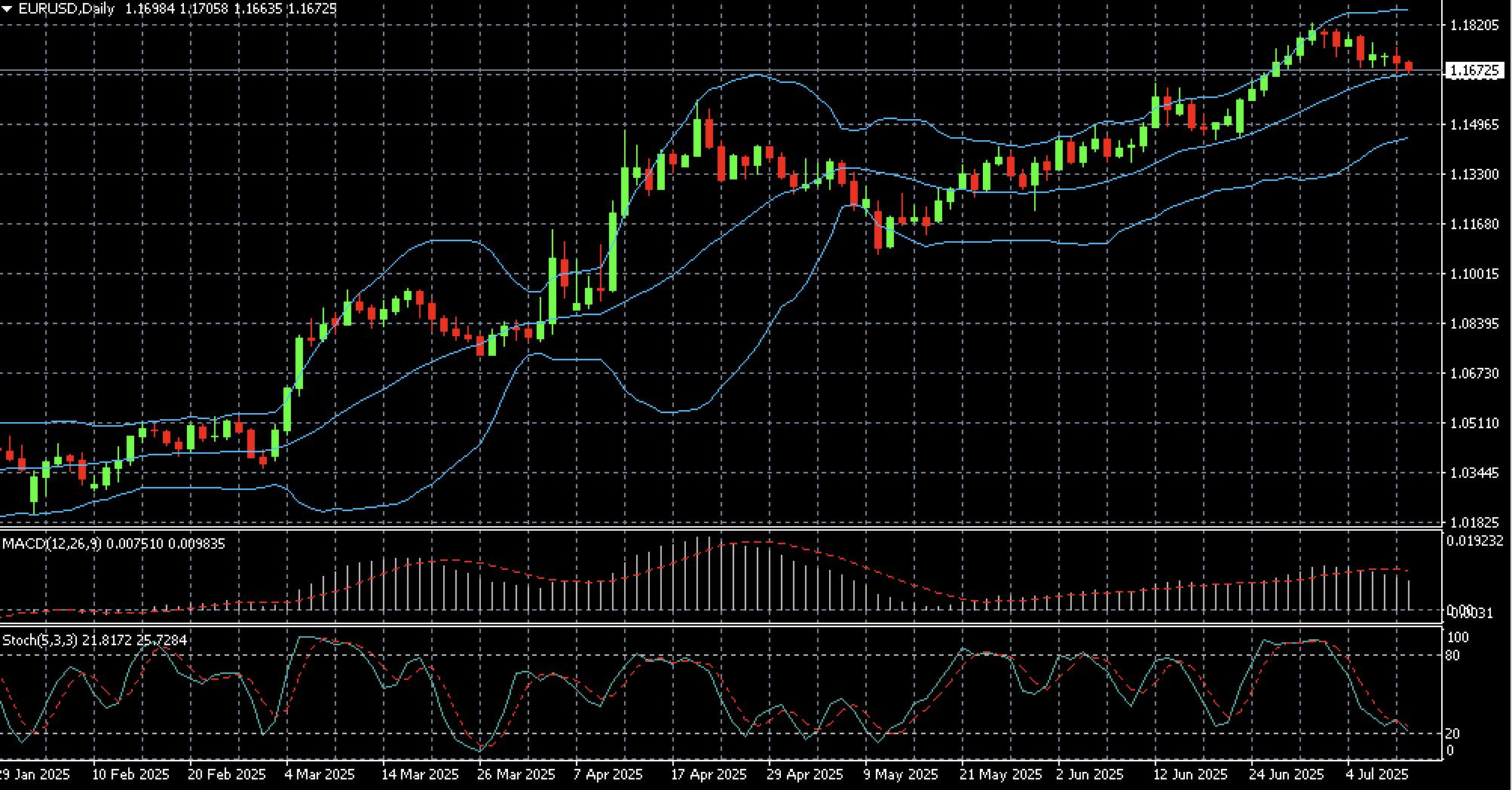Forecast for EURUSD for the week: tariffs in focus, but there's more to it
Previously, EURUSD rose steadily but entered a consolidation phase on Friday. Strong data from the Eurozone supported the euro, while a strengthening dollar amid US trade threats acted as a restraining factor. The market paused, awaiting new signals from the Fed and fresh statistics. In this weekly forecast, we analyse key factors that could determine the euro’s further trajectory – from inflation expectations to Washington’s tariff policy.
EURUSD forecast for this week: quick overview
- Market focus: Donald Trump is stepping up tariff policy. Measures imposing a 35% tariff on Canadian imports and 15-20% on several other countries have been signed. Investors’ attention also focuses on Fed statements, which remain cautious with no signals of an imminent rate cut.
- Current trend: the medium-term uptrend in EURUSD remains intact despite local fluctuations. In the short term, consolidation is observed within the 1.1760-1.1790 range.
- EURUSD forecast for 14-18 July 2025: if support holds above 1.1680, growth towards 1.1835 with an attempt to break towards 1.1900 is likely. Support levels – 1.1680 and 1.1630. A break below opens the way towards 1.1439.
EURUSD fundamental analysis
From a fundamental perspective, EURUSD looks stable but vulnerable to risks. The main driver favouring the USD was new tariff measures: Donald Trump’s administration announced a 35% tariff on Canadian imports from 1 August, and tariffs of 50% on copper and Brazilian goods.
Additionally, blanket tariffs of 15–20% on most US trading partners are under consideration. These decisions heightened fears of a global slowdown and increased demand for the US dollar as a safe haven.
As a result, EURUSD came under pressure due to USD strengthening and investors shifting focus to the US. Statistics were scarce, as usual for mid-month. Initial jobless claims in the US remain relatively low but show signs of a cooling labour market.
Comments from Chicago Fed’s Goolsbee dismissed the idea of swift policy easing to support the budget. He emphasised that inflation and employment remain priorities. These signals strengthened the USD and reduced the likelihood of a rate cut in the coming months.
EURUSD technical analysis
On the daily chart in July 2025, EURUSD shows signs of slowing bullish momentum after a prolonged rally since March. After reaching a high around 1.1820, quotes corrected downwards and stabilised near 1.1670 by mid-July. The movement remains within the upper part of the Bollinger Bands, but with a clear pullback to the midline, which may signal the start of a consolidation or correction phase. Indicators confirm this assumption.
MACD indicates weakening bullish momentum as the histogram declines and lines are close to crossing from top to bottom.
The Stochastic is already in the oversold zone, creating conditions for a short-term upward rebound. Support forms around 1.1620-1.1600, with resistance in the 1.1750-1.1800 area.
Overall market sentiment is neutral with a possible shift to a correction if no new growth drivers appear.
EURUSD trading scenarios
Given the current picture, EUR/USD sentiment for the week remains cautiously bullish. However, high sensitivity to tariff news and Fed signals calls for caution. The rate remains in a range, and further dynamics depend on USD factors and macro statistics.
- Buying scenario:
If EURUSD holds above 1.1685 and stabilises on daily/4H timeframes (e.g. consolidation with rising volumes or reversal signals from oscillators) this confirms conditions for opening long positions.
The first target is resistance at 1.1835. Securing above this zone will strengthen the bullish impulse and open the way towards 1.1900 and 1.1960. Stop-loss – below 1.1630, as breaking this zone would disrupt the current upward structure.
- Selling/short scenario:
If the pair fails to overcome 1.1835 and forms a reversal pattern (e.g. ‘shooting star’ or ‘double top’), especially amid strong USD signals – short positions are acceptable.
Nearest targets – 1.1685 and then 1.1630. Stop-loss in this case – above 1.1855 to avoid losses from a false breakout.
This scenario is short-term, as the medium-term trend remains neutral-to-bullish.
Summary
The upward trajectory of EURUSD remains amid moderate Fed rhetoric and stable macro data from the Eurozone. Market participants continue pricing in expectations of steady rates in the US and a possible rate cut by year-end, while inflationary pressures persist in the Eurozone.
As long as EURUSD holds above key support at 1.1685, the base scenario for the week is a move towards 1.1835 with a possible breakout towards 1.1900. Stable demand for the euro will continue if the Fed maintains neutral rhetoric and no new geopolitical shocks emerge. Focus remains on fresh Eurozone inflation data, and US consumption and inflation reports, which will determine EURUSD’s further direction.
Forecasts presented in this section only reflect the author’s private opinion and should not be considered as guidance for trading. RoboForex bears no responsibility for trading results based on trading recommendations described in these analytical reviews.


